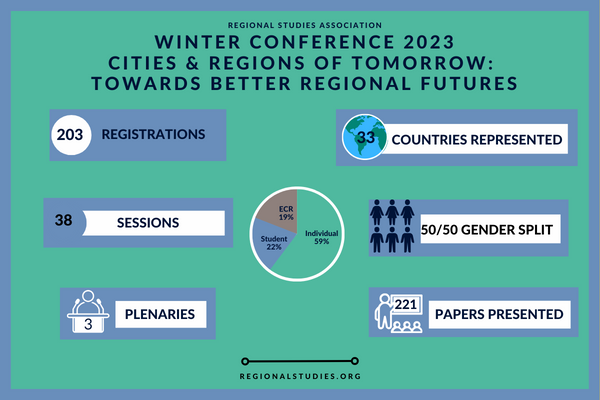Date and time

The RSA Winter Conference took place from 9th-10th November 2023 at The Cumberland Hotel, London. Participants enjoyed two days of presentations, discussion, plenary sessions and a special tribute to our outgoing CEO Sally Hardy.
More Information about the Conference
Recent years have been dominated by external shocks (the Covid pandemic, war in Ukraine), crises (in energy, cost of living) and emergencies (the climate emergency, African food crisis). During this time regional research and debate has focused on regions ‘in crisis’, ‘in transition’ and ‘in recovery’. While it is too early to declare an end to these turbulent times, the focus is switching to the impact of the changes to how people, work and human activity is taking place in, between and across regions. Discussion is also centering on planning the future design, form and function of regions, cities and rural areas.
The Regional Studies Association Winter Conference 2023 presented a timely opportunity to discuss and debate these important issues, to establish the need and nature of future research imperatives in the field, and to assess options for practitioners and policymakers in working towards better regional futures.
- Designing the regions, cities and rural areas of tomorrow
- Cities and regions in a post-Covid world
- Reviving left behind places and tackling uneven development
- Industry 4.0 and the future shape of innovation, industrial development and strategy
- Data analytics, smart cities, AI and the digital transformation
- Planning for demographic change, migratory trends and an ageing society
- Energy transitions, environmental sustainability, and the role of regions in achieving Net Zero
- Regional strategies for enhancing security (e.g. health, food, energy, data, financial, geopolitical, democracy)
- Alternative models for regional development (e.g. foundational, circular, post-growth)
- The role of data, research and evidenced based policy in a post-truth age ▪ Finance, investment, trading relations and their regional impacts
- The role of universities and other institutions in (re)shaping regions
- Tools and techniques for visualising and modelling regional trends
- The changing geographies and spatial impacts of global investment flows, Global Value Chains
- Global migration flows and the integration of migrants into cities and regions
- Technological change, innovation and its implications
- Industrial policy